《牛津英语》(六年级第一学期)
6A上海牛津英语六年级第一学期重点词组和句型1
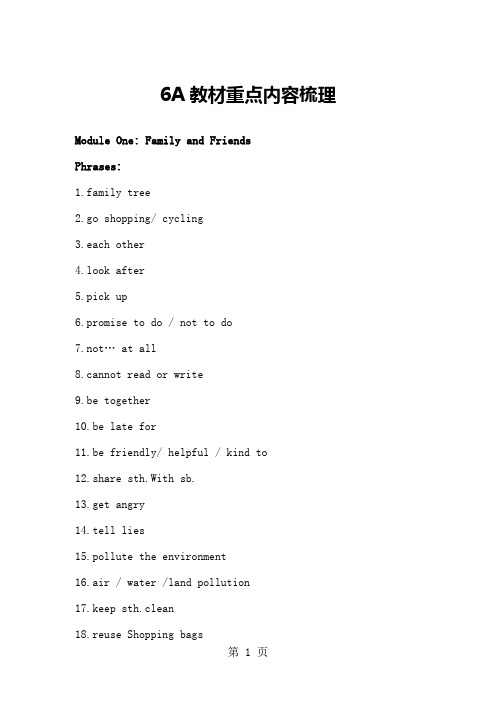
6A教材重点内容梳理Module One: Family and FriendsPhrases:1.family tree2.go shopping/ cycling3.each other4.look after5.pick up6.promise to do / not to do7.not… at all8.cannot read or write9.be together10.be late for11.be friendly/ helpful / kind to12.share sth.With sb.13.get angry14.tell lies15.pollute the environment16.air / water /land pollution17.keep sth.clean18.reuse Shopping bags19.put rubbish into rubbish bins20.leave rubbish21.friends of the earth22.discuss sth.With sb.23.at weekends/at the weekend24.a photo of sb25.be near / far from …26.have lunch /dinner/ a picnic/ a barbecue27.fly kites28.ride bicycles29.make sandcastles30.collect shellsSentence patterns:1.A: How many brothers/… do you have?B: I (only) have one brother.2.A: what do you do with your …?B: I always/usually/ sometimes play games with ….A: What else do you do with sb.?B: I sometimes … with …3.A: Have you been to …?B: I have just/already been to … / there./ I haven’t been to …/there yet.4.What about/How about + n./ving…?5.A: What do you usually do at weekends?B.I usually …6.A: Is … near or far away from …?B.It is near/ far away from….7.A: Where have you been?8.B: I have been to….9.Which place shall we visit?10.When shall we go there?11.What time?12.When are we going to come back?13.How are we going to get there?14.How much does it cost?Module Two: Places and Activities Phrases:1.a bank clerk2.a shop assistant3.put out fires4.cook food5.make our city a safe place6.look at7.listen to8.arrive at9.have tea10.at the entrance11.on the ground/ first floor12.on the open day13.at half past eight in the morning14.First,../ Next,… /Then,… /After that,…/Finally, …15.take photos16.by ferry/ by underground/ on foot17.on the bus18.go to school19.a lot of/ some/ a few20.live near/far away from school21.an advertisement board22.light rail23.a department store24.a housing estate25.a police station26.half an hour27.wait for28.walk on the grass29.keep quiet30.run across the road31.pick the flowers32.turn left/right33.on the right/left34.in the middle35.go upstairsSentence patterns:1.A: Would you like to be a/an…?B: Yes, I would.//No, I wouldn’t.A: Why?/Why not?B: I would /wouldn’t like to be a/an…because I…2.A: What would you like to be?B: I would like to be…3.A: Do you live near or far away from …?B: I live near/far away from ….A: How do you go to school?B: I go to school by…/on foot.A: How long does it take?B: It takes …4.A: How long does it take you to get to…?B: It takes me about…to get there.5.A: What does Simon see when he is walking to school?B: Simon sees ...when he is walking to school.6. What does this sign mean?7. We must not eat or drink./Don’t eat or drink.8. We must …9. A: Which escalator must we use?B: We must use the one in the middle.Module Three: Food and Drinkphrases1.fried cabbage/chicken wings2.steamed prawns with garlic3.boiled eggs4.a shopping list5.at the vegetable stall6.in the frozen food section7.in the market/supermarket8.have a picnic9.a bottle of jam10.a packet of nuts 11.a slice / slices of12.an unhealthy diet13.do exercise14.live in the countryside15.stay with sb.16.plenty of / a lot of17.a little/ some18.my favourite breakfast19.too much spicy food20.eating habits21.the food pyramidSentence patterns:1.A: What would you like for dinner tonight?B: I’d like … for dinner.A: What kind of … would you like?Would you like … or …?B: I’d like…2.A: Have you bought any…?B: Yes, I’ve bought some…A: Where did you buy it/them?B: In the market, at the…stall/in the…section.A: How much was it/were they?B: It was /They were…yuan.3.A: Shall we buy some soft drinks?B: Ok./ That’s a good idea.4.Let’s buy some bread and a bottle of jam.Let’s go to the supermarket to buy some food and drink for the picnic.5.A: Would you like some…?B: No, thanks / yes, please6.A: Why do you like…?B: I like it/them because it’s/they’re sweet/delicious/tasty/spicy.7.A: Why not?B: I don’t want … because it is too ….8.A: May I have some …, please?9. B.Ok/ Sure/ All right/ Yes, you may.Here you are.//NO, youmay not./ I’m afraid you can’t..10.A: How much sugar do we need every day?B: We need a little sugar every day.11.A: Which one was healthier/less healthy?B: …’s diet was healthier than/less healthy than/as healthy as/as unhealthy as …’s diet.12.How much … do we need?13.What do you usually have for breakfast/ lunch /dinner?14.A: What did you have for breakfast yesterday?。
牛津英语(上海版)6年级上学期知识点罗列(1)

牛津英语(上海版)6年级上学期知识点罗列(1)1. family 表示家庭的时候,它是单数名词表示家庭成员的时候,它是复数名词Tom’s family is a happy one. 家庭The Wang’s family go to America every year. 家庭成员FAMIL Y: F ather a nd m other I l ove y ou.2. grandfather 爷爷great-grandfather 曾祖父granddaughter 孙女great-granddaughter 曾孙女3. classmate 同学deskmate 同桌workmate 同事roommate 室友schoolmate 校友4. get sth. from sb. 从某人那里得到某物He doesn’t get any money from his parents.5. 频度副词always, usually, often, sometimes, seldom, never频度副词的位置:放在行为动词之前,be动词之后I sometimes watch TV with my grandmother.He is always late for school.6. What else do you do with her?What else 还有什么Who else will he meet? 他还要见谁?Where else will you go?---- else 用于特殊疑问词之后Anything else? 还有什么东西么?Anyone else? 还有谁么?1. exciting 令人兴奋的,使人激动的---通常修饰事物excited 感到兴奋的,感到激动的---通常修饰人interesting – interestedboring – bored 无聊的surprising – surprised 惊奇的2. who 主格whom 宾格whose 所有格My grandparents usually go to see a film with my mother. 对划线部分提问Who/Whom do your grandparents usually go to see a film with?3. Watching TV is one of the most important activities of the day.动名词短语做主语。
牛津上海版英语六年级上学期教材梳理及练习 Unit1
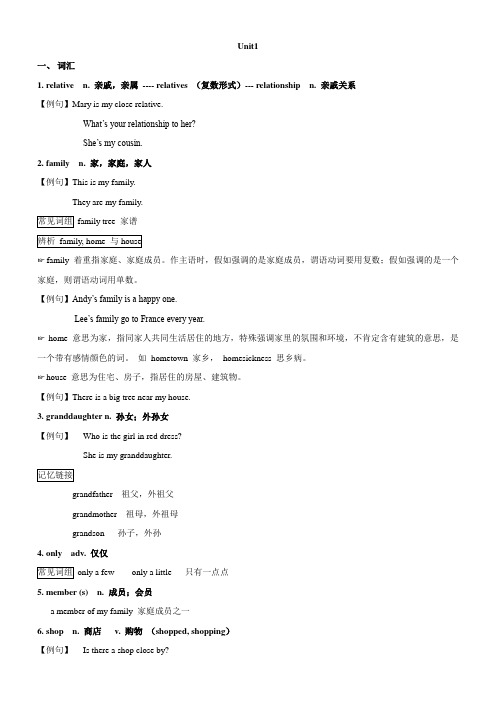
Unit1一、词汇1.relative n. 亲戚,亲属---- relatives (复数形式)--- relationship n. 亲戚关系【例句】Mary is my close relative.--- What’s your relationship to her?--- She’s my cousin.2.family n. 家,家庭,家人【例句】This is my family.They are my family.family tree 家谱☞ family 着重指家庭、家庭成员。
作主语时,假如强调的是家庭成员,谓语动词要用复数;假如强调的是一个家庭,则谓语动词用单数。
【例句】Andy’s family is a happy one.Lee’s family go to France every year.☞home 意思为家,指同家人共同生活居住的地方,特殊强调家里的氛围和环境,不肯定含有建筑的意思,是一个带有感情颜色的词。
如hometown 家乡,homesickness 思乡病。
☞ house 意思为住宅、房子,指居住的房屋、建筑物。
【例句】There is a big tree near my house.3. granddaughter n. 孙女;外孙女【例句】--- Who is the girl in red dress?--- She is my granddaughter.grandfather 祖父,外祖父grandmother 祖母,外祖母grandson 孙子,外孙4. only adv. 仅仅only a few only a little 只有一点点5. member (s) n. 成员;会员a member of my family 家庭成员之一6. shop n. 商店v. 购物(shopped, shopping)【例句】--- Is there a shop close by?--- Yes, there is a big shop on the right.--- I want to go shopping tomorrow.--- I’ll go with you.bookshop 书店shopping bag 购物袋shopping centre 购物中心shopping mall 大型购物商场go shopping 去购物= do some shopping 【例句】I have to go shopping this afternoon.= I have to do some shopping this afternoon. 7. else adv. 别的,其他的【例句】--- What else do you want?--- Nothing else, thank you.someone/anybody/nobody elsenothing/something/anything elsewho elsewhere elsewhat else?who else? 强调还有什么/谁...?8. badminton n. 羽毛球【例句】Tom likes playing badminton.play + 球类运动【例如】play tennis 打网球play table tennis 打乒乓球play football 踢足球play volleyball 打排球9. cycle n. 自行车v. 骑自行车【例句】They want to go there by cycle.He cycles to work every day.cycle 作名词时还有周期、循环的意思。
六年级牛津英语上册
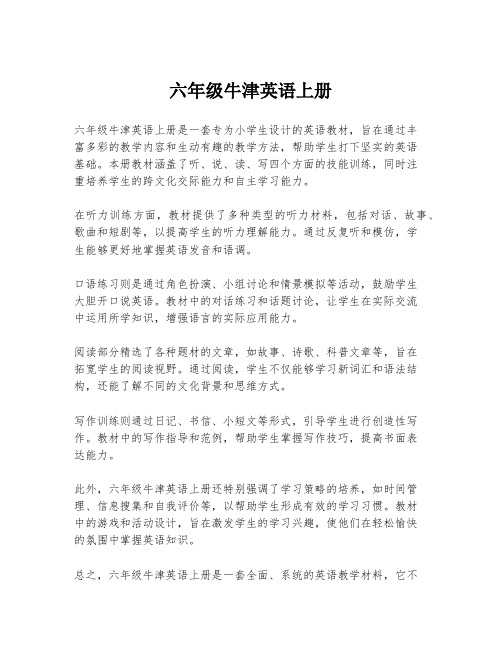
六年级牛津英语上册
六年级牛津英语上册是一套专为小学生设计的英语教材,旨在通过丰
富多彩的教学内容和生动有趣的教学方法,帮助学生打下坚实的英语
基础。
本册教材涵盖了听、说、读、写四个方面的技能训练,同时注
重培养学生的跨文化交际能力和自主学习能力。
在听力训练方面,教材提供了多种类型的听力材料,包括对话、故事、歌曲和短剧等,以提高学生的听力理解能力。
通过反复听和模仿,学
生能够更好地掌握英语发音和语调。
口语练习则是通过角色扮演、小组讨论和情景模拟等活动,鼓励学生
大胆开口说英语。
教材中的对话练习和话题讨论,让学生在实际交流
中运用所学知识,增强语言的实际应用能力。
阅读部分精选了各种题材的文章,如故事、诗歌、科普文章等,旨在
拓宽学生的阅读视野。
通过阅读,学生不仅能够学习新词汇和语法结构,还能了解不同的文化背景和思维方式。
写作训练则通过日记、书信、小短文等形式,引导学生进行创造性写作。
教材中的写作指导和范例,帮助学生掌握写作技巧,提高书面表
达能力。
此外,六年级牛津英语上册还特别强调了学习策略的培养,如时间管理、信息搜集和自我评价等,以帮助学生形成有效的学习习惯。
教材
中的游戏和活动设计,旨在激发学生的学习兴趣,使他们在轻松愉快
的氛围中掌握英语知识。
总之,六年级牛津英语上册是一套全面、系统的英语教学材料,它不
仅注重语言知识的传授,更重视学生综合语言能力的培养。
通过本册教材的学习,学生将能够在英语听说读写各方面取得显著进步。
牛津上海版英语六年级上学期Module 1 Family and friends Uni
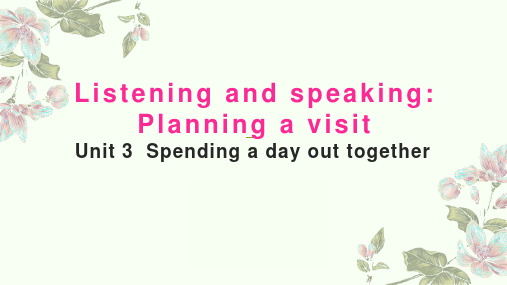
• Before going on a trip with your family or friends, what do you need to think about first?
• When? • What time? • Which place? • How to get there? • How much?
How are we going to get there?
Let’s go by ; v.原形…
How much does it cost? 将要做…
taking a bus to Ocean Park
When are we going to come back?
10:00 = 10 a.m. = 10 o’clock in the morning
Listening and speaking: Planning a visit
Unit 3 Spending a day out together
• Have you been on a one-day trip (旅行) with your • Wfamheilrye?do you usually go on a trip with your family? • Where do you usually go on a trip with your friends?
Plan (计划) a trip !
• date • time • place • way • cost
/kɒst/ v. 花费 n. 花费
• What do they talk about?
• When? • What time? • Which place? • How to get there?
沪教牛津版六年级上册英语全册教案(含单元知识点总结)
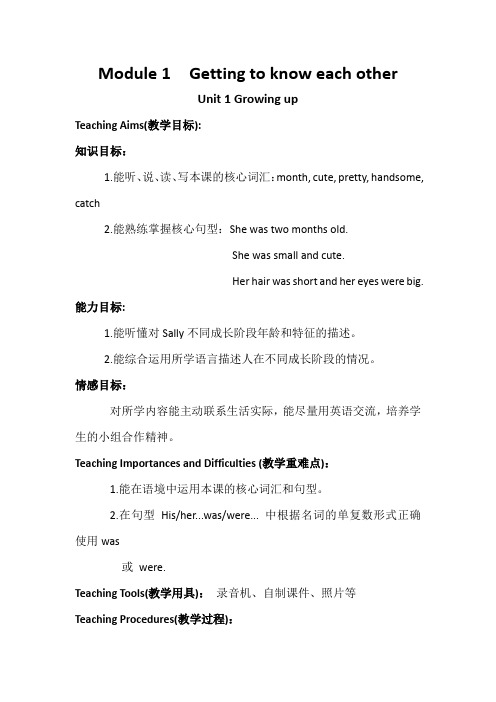
Module 1 Getting to know each otherUnit 1 Growing upTeaching Aims(教学目标):知识目标:1.能听、说、读、写本课的核心词汇:month, cute, pretty, handsome, catch2.能熟练掌握核心句型:She was two months old.She was small and cute.Her hair was short and her eyes were big.能力目标:1.能听懂对Sally不同成长阶段年龄和特征的描述。
2.能综合运用所学语言描述人在不同成长阶段的情况。
情感目标:对所学内容能主动联系生活实际,能尽量用英语交流,培养学生的小组合作精神。
Teaching Importances and Difficulties (教学重难点):1.能在语境中运用本课的核心词汇和句型。
2.在句型His/her...was/were... 中根据名词的单复数形式正确使用was或were.Teaching Tools(教学用具):录音机、自制课件、照片等Teaching Procedures(教学过程):StepⅠ.Warm up and revision(热身与复习)1. Greetings.2. Do some warming-up exercises.3. Review the numbers.Step Ⅱ.Presentation and practice(呈现新语言知识和练习)1. Lead in.T: How old are you?S1: I’m eleven years oldT: You’ll be twelve years old next year. You’re growing up.2. Show some photos and introduce the new words.3. Learn to say and use the words.4. Talk about the photos of Sally.5. Watch the screen and learn to say the sentences.6. Ask pupils to practise in groups.Sept Ⅲ. Learn the story (学习课文)1. Read the story and learn to say the useful sentences.2. Watch the cartoon.Module 1 Getting to know each otherUnit 2 My summer holidayTeaching Aims(教学目标):1.能听、说、读、写本课的核心词汇:famous, during, spend, everyone,countryside2.能熟练掌握核心句型:How was your summer holiday?It was wonderful. We went to the Great Wall.Everyone had a good time.3.读懂有关暑假生活的对话,学会询问别人和介绍自己的暑假生活。
(牛津上教版)六年级第一学期单词默写
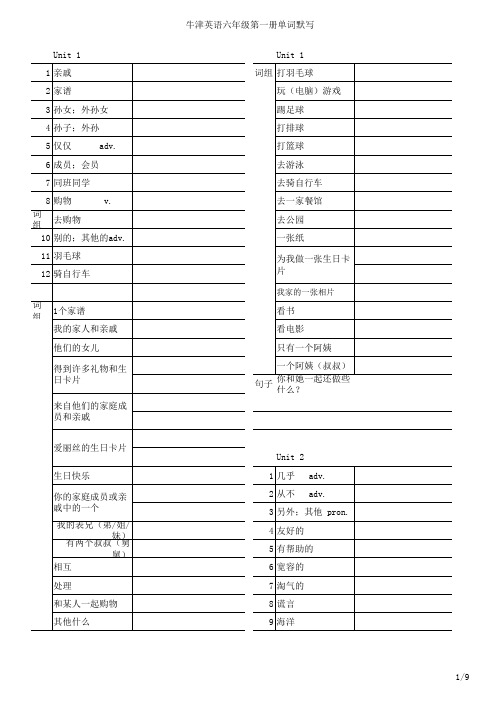
在星期六
在工作日
在七月十日 在周末 照顾环境 污染环境 我们周围的事物
2/9
牛津英语六年级第一册单词默写
Unit 2
Unit 3 词组 在11月15日
承诺不做…… 在上海 遵守我的承诺 与某人谈论某事 再利用购物袋 在学校 在幸运岛 在绿色市场 在外渡过(玩)一天 Unit 3 1 度过 2 岛屿 3 海湾 4龙 5 周末 6 海边;海滨 7 好运的;幸运的 8 市场 9 太空 10 博物馆 11 活动 12 烧烤 13 风筝 14 沙堡 15 收集 16 照片簿;集邮册 17 计划 18 将要;……好吗? 19 ……点钟 20 花费 v. 21 花费 n. 22 旅行 词组 在9月 在5点钟时 v. 远离…… 离……很近 一张……的相片
5/9
牛津英语六年级第一册单词默写
Unit 6 词组 做某事花了某人多 少时间
Unit 7 词组 不要在教室里跑!① 不要在教室里跑! ②
某人花了多少时间 做某事 不要在教室里跑! ③ 某人在某物上花了 多少钱 不要在上课时吃东 西 看到许多饭店 左边那一个 Unit 7 1 规则 这个标志意味着什 么? 2 等待 3 进入 4 大声地 adv. 我们在哪里可以发 现它? 5 表示……的意思 6 电梯 7 自动扶梯 8 在左/右边 9 中心;中央 10 出口 11 向楼上;在楼上 12 中间;中央 13 在中间;在中央 14 追赶 词组 不准 不得进入
与老师一起开茶话 会 见教师
4/9
牛津英语六年级第一册单词默写
Unit 5 词组 首先……然后…… 其次……之后…… 最后 最后 在工艺美术教室 在音乐室 在大厅 欢迎家长 想让某人做某事 邀请某人做某事 写一张请帖 在不同的地方
上海版牛津英语六年级上unitunit课本解析
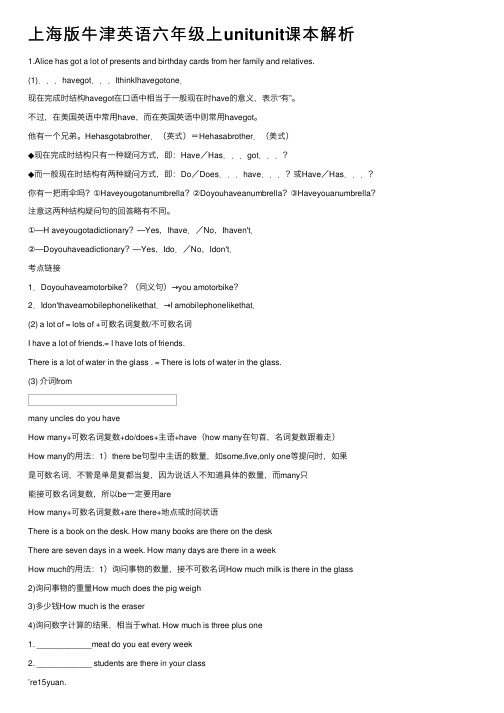
上海版⽜津英语六年级上unitunit课本解析1.Alice has got a lot of presents and birthday cards from her family and relatives. (1)...havegot...IthinkIhavegotone.现在完成时结构havegot在⼝语中相当于⼀般现在时have的意义,表⽰“有”。
不过,在美国英语中常⽤have,⽽在英国英语中则常⽤havegot。
他有⼀个兄弟。
Hehasgotabrother.(英式)=Hehasabrother.(美式)◆现在完成时结构只有⼀种疑问⽅式,即:Have/Has...got...?◆⽽⼀般现在时结构有两种疑问⽅式,即:Do/Does...have...?或Have/Has...?你有⼀把⾬伞吗?①Haveyougotanumbrella?②Doyouhaveanumbrella?③Haveyouanumbrella?注意这两种结构疑问句的回答略有不同。
①—H aveyougotadictionary?—Yes,Ihave./No,Ihaven't.②—Doyouhaveadictionary?—Yes,Ido./No,Idon't.考点链接1.Doyouhaveamotorbike?(同义句)→you amotorbike?2.Idon'thaveamobilephonelikethat.→I amobilephonelikethat.(2) a lot of = lots of +可数名词复数/不可数名词I have a lot of friends.= I have lots of friends.There is a lot of water in the glass . = There is lots of water in the glass.(3) 介词frommany uncles do you haveHow many+可数名词复数+do/does+主语+have(how many在句⾸,名词复数跟着⾛)How many的⽤法:1)there be句型中主语的数量,如some,five,only one等提问时,如果是可数名词,不管是单是复都当复,因为说话⼈不知道具体的数量,⽽many只能接可数名词复数,所以be⼀定要⽤areHow many+可数名词复数+are there+地点或时间状语There is a book on the desk. How many books are there on the deskThere are seven days in a week. How many days are there in a weekHow much的⽤法:1)询问事物的数量,接不可数名词How much milk is there in the glass2)询问事物的重量How much does the pig weigh3)多少钱How much is the eraser4)询问数字计算的结果,相当于what. How much is three plus one1. ____________meat do you eat every week2. ____________ students are there in your class’re15yuan.A.HowmanyisB.HowmanyareC.HowmuchisD.Howmuchare usually go shopping with my aunt.(1) always 总是usually 通常often 经常sometimes有时候never从不表⽰频率,在句中可看做是插⼊语。
六年级上册英语单词表牛津版

六年级上册英语单词表牛津版Unit 1month 一个月的时间;月份cute 可爱的pretty 漂亮的handsome 英俊的;帅气的turtle 乌龟catch 逮住;扑捉fly 苍蝇grow up 长大;成长junior high school 初级中学(be) born 出生Unit 2famous 著名的;出名的during 在......期间spend 度过everyone 每个人;所有人countryside 乡村;农村pick 采摘summer holiday 暑假Unit 3healthy 健康的;有益于健康的unhealthy 不健康的;损害健康的hamburger 汉堡包cola 可乐yesterday 昨天fruit 水果pie 馅饼pizza 比萨饼sandwich 三明治vegetable 蔬菜chicken 鸡肉chocolate 巧克力a little 少量的fish and chips 炸鱼薯条Unit 4 neighbour [ˈneɪbə(r)] 邻居son [sʌn] 儿子daughter [ˈdɔːtə(r)] 女儿noisy [ˈnɔɪzi] 吵闹的owl [aʊl] 猫头鹰dig [dɪɡ] 挖(土);掘(洞) make noise 制造噪音Unit 5 thousand [ˈθaʊznd] 一千hundred [ˈhʌndrəd] 一百wild [waɪld] 野生环境;野生的South China tiger 华南虎blue whale 蓝鲸way [weɪ] 路;方式;方法die [daɪ] 死;死亡rhino [ˈraɪnəʊ] 犀牛learn [lɜːn] 学会;学习send [send] 安排去;寄;送in danger 面临危险in the past 在过去take care of 照顾;照料go for a walk 去散步drive away 赶走Unit 6e-friend 网友country [ˈkʌntri] 国家other [ˈʌðə(r)] 其他的team [tiːm] (游戏或运动的)队hobby [ˈhɒbi] 业余爱好grade [ɡreɪd] 年级yourself [jɔːˈself] 你自己would like (表示愿意、喜欢)。
牛津英语上海版六年级第一学期 6A Unit 3教案(4课时,含教后感)
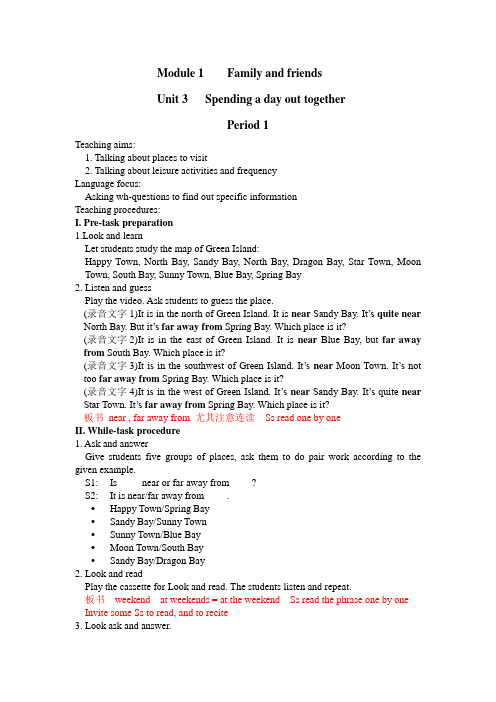
Module 1 Family and friendsUnit 3 Spending a day out togetherPeriod 1Teaching aims:1. Talking about places to visit2. Talking about leisure activities and frequencyLanguage focus:Asking wh-questions to find out specific informationTeaching procedures:I. Pre-task preparation1.Look and learnLet students study the map of Green Island:Happy Town, North Bay, Sandy Bay, North Bay, Dragon Bay, Star Town, Moon Town, South Bay, Sunny Town, Blue Bay, Spring Bay2. Listen and guessPlay the video. Ask students to guess the place.(录音文字1)It is in the north of Green Island. It is near Sandy Bay. It’s quite near North Bay. But it’s far away from Spring Bay. Which place is it?(录音文字2)It is in the east of Green Island. It is near Blue Bay, but far away from South Bay.Which place is it?(录音文字3)It is in the southwest of Green Island. It’s near Moon Town. It’s not too far away from Spring Bay.Which place is it?(录音文字4)It is in the west of Green Island. It’s near Sandy Bay. It’s quite near Star Town. It’s far away from Spring Bay. Which place is it?板书near , far away from 尤其注意连读Ss read one by oneII. While-task procedure1. Ask and answerGive students five groups of places, ask them to do pair work according to the given example.S1: Is ____ near or far away from ____?S2: It is near/far away from ____.•Happy Town/Spring Bay•Sandy Bay/Sunny Town•Sunny Town/Blue Bay•Moon Town/South Bay•Sandy Bay/Dragon Bay2. Look and readPlay the cassette for Look and read. The students listen and repeat.板书weekend at weekends = at the weekend Ss read the phrase one by one Invite some Ss to read, and to recite3. Look ask and answer.Ask students to talk in pairs what they usually do at weekends according to the map and pictures.Dialogues are given like this:S1: What do you usually do at weekends?S2: I usually … in _____ (place).S1: Is _____ near or far away from _____?S2: It’s near/far away from _____.III. Post-task activities1. Ask and answerInvite students to ask their classmates/teachers about what they usually do at weekends and where they do it, like this:S1: What do you usually do at weekends?S2: I usually … in _____ (place).S1: Is _____ near or far away from _____?S2: It’s near/far away from _____.2. Listen and sayPlay the cassette of two dialogues, ask students to complete the table.1) Miss Guo usually goes to ______________ in ______________. She usually___________ in __________________. It is ________________ her home.2) Miss Guo usually _________ to __________________ in ___________. Sheusually ________________ in _____________________________. It is ________________ her home.Show the dialogues to Ss, read together.(3.Option 1. Look and sayAsk students to do pair work according to the map of Shanghai.•Talk in pairs about what you do at weekends and where you usually go at weekends.•Then talk about whether the places you go to are near or far away from your home.•You may also talk like this: Nanjing Road is near the Bund, but far away from Xujiahui.•You can talk about the places which are not marked on the map. 不上)Consolidation1.Workbook 6A P152.Copy the new words & phrases3.Recite the text on P16教后记:课文简单易学,只是在读map时和学习far away from 连读时,用时较多,特别是连读,有些学生多次提醒仍是忘记。
沪教版牛津英语六(上)语法点
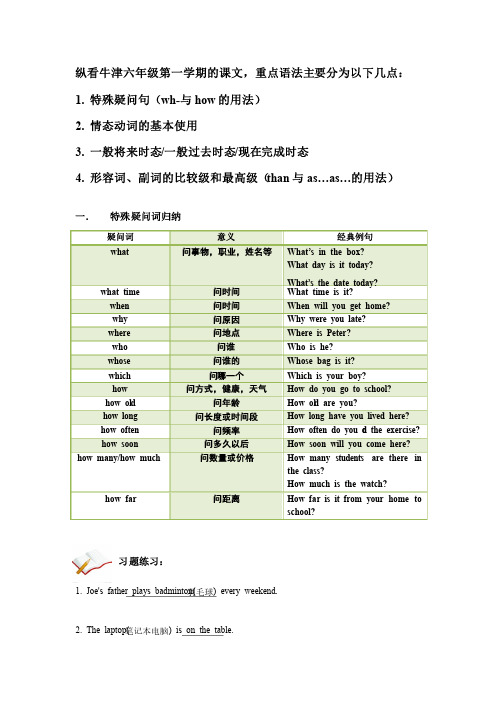
纵看牛津六年级第一学期的课文,重点语法主要分为以下几点: 1. 特殊疑问句(wh-与how 的用法) 2. 情态动词的基本使用3. 一般将来时态/一般过去时态/现在完成时态4. 形容词、副词的比较级和最高级(than 与as as……as as……的用法)一. 特殊疑问词归纳疑问词 意义经典例句what 问事物,职业,姓名等What’s in the box?What day is it today? What’s the date today? what time 问时间 What time is it? when 问时间 When will you get home? why 问原因 Why were you late? where 问地点 Where is Peter? who 问谁 Who is he? whose 问谁的Whose bag is it? which 问哪一个Which is your boy? how 问方式,健康,天气How do you go to school? how ol how old d 问年龄 How ol d are you? d are you? how long 问长度或时间段How long have you lived here? how often 问频率 How often do you d o the exercise? o the exercise? how soon 问多久以后 How soon will you come here? how many/how much 问数量或价格How How many many students are are there there in the class? How much is the watch? how far 问距离How How far far far is is is it it it from from from your your your home home to school? 习题练习:1. Joe's father plays badminton(羽毛球) every weekend.2. The laptop(笔记本电脑) is on the table. 3. My mother is a nurse in the hospital. 4. He gets up at 6:30 in the morning. 5. Li Lei goes to work on foot. 6. It is about 20 kilometers from my home to the town. 7. I have lived in Hang Zhou for 20 years. 8. I’m looking for my watch. 9. The train will start in three minutes. 10. Alice has the violin lesson twice a week. 11. The building with green wall is the post office. 12. He didn’t come because he was ill. 注意事项:由于特殊疑问词孩子们从小学就已经开始接触,对于最基本的what/how/where 等并不感到陌生,出题的难度一般也不会很大。
牛津上海版英语六年级第一学期——时态讲解及巩固练习(有答案)
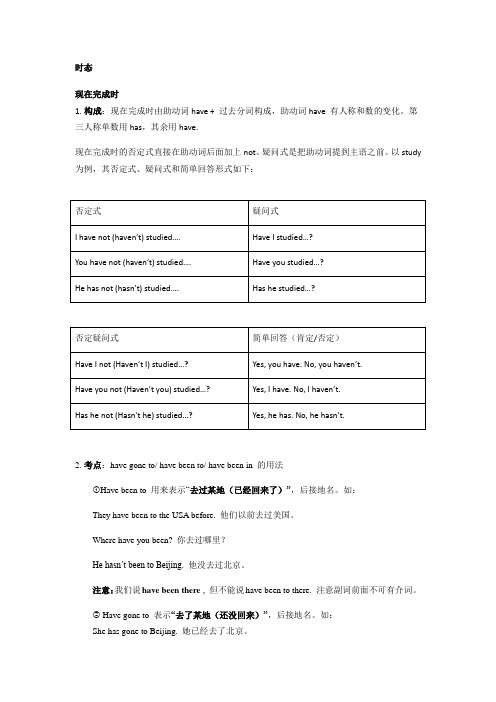
时态现在完成时1.构成:现在完成时由助动词have + 过去分词构成,助动词have 有人称和数的变化。
第三人称单数用has,其余用have.现在完成时的否定式直接在助动词后面加上not、疑问式是把助动词提到主语之前。
以study 为例,其否定式、疑问式和简单回答形式如下:2.考点:have gone to/ have been to/ have been in 的用法①Have been to 用来表示“去过某地(已经回来了)”,后接地名。
如:They have been to the USA before. 他们以前去过美国。
Where have you been? 你去过哪里?He hasn’t been to Beijing. 他没去过北京。
注意:我们说have been there , 但不能说have been to there. 注意副词前面不可有介词。
② Have gone to 表示“去了某地(还没回来)”,后接地名。
如:She has gone to Beijing. 她已经去了北京。
③ Have been in 表示“呆在某地”。
She has been in Beijing for 3 years. 她呆在北京三年了。
3.重点:现在完成时的句子中,常常用到副词①already : 表示动作发生于现在之前,距离现在时间较长,位于句中。
He went to the USA two years ago and came back a year ago. 他两年前去了美国,一年前回来了。
②just: 表示动作发生于现在之前,但距离现在时间较短,位于句中Susan went to the UK two years ago and came back yesterday. Susan has just been to the UK.苏珊两周前去了英国,昨天回来。
苏珊刚刚去英国。
③yet: 表示现在之前动作没有发生,但将来有可能发生。
牛津上海版小学英语六年级上册(英语单词表)
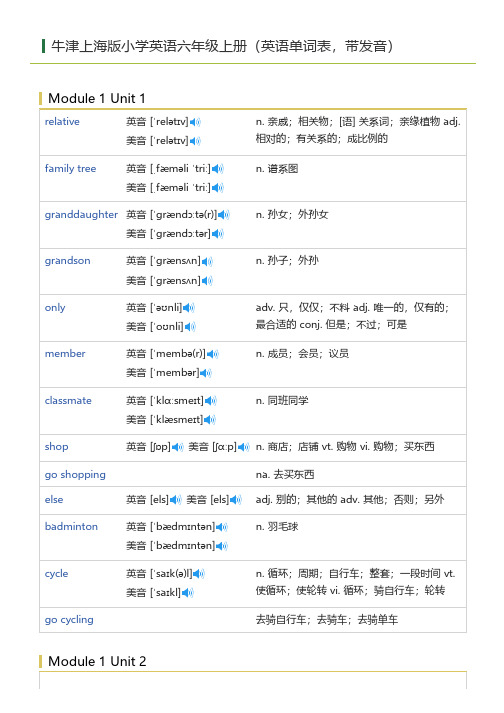
牛津上海版小学英语六年级上册(英语单词表,带发音)Module 1 Unit 1Module 1 Unit 2relative英音 [ˈrel ət ɪv]美音 [ˈrel ət ɪv]n. 亲戚;相关物;[语] 关系词;亲缘植物 adj.相对的;有关系的;成比例的family tree英音 [ˌfæm əli ˈtri ː]美音 [ˌfæm əli ˈtri ː]n. 谱系图granddaughter 英音 [ˈɡrænd ɔːt ə(r)]美音 [ˈɡrænd ɔːt ər]n. 孙女;外孙女grandson英音 [ˈɡræns ʌn]美音 [ˈɡræns ʌn]n. 孙子;外孙only英音 [ˈəʊnli]美音 [ˈo ʊnli]adv. 只,仅仅;不料 adj. 唯一的,仅有的;最合适的 conj. 但是;不过;可是member英音 [ˈmemb ə(r)]美音 [ˈmemb ər]n. 成员;会员;议员classmate英音 [ˈklɑːsme ɪt]美音 [ˈklæsme ɪt]n. 同班同学shop 英音 [ʃɒp]美音 [ʃɑːp]n. 商店;店铺 vt. 购物 vi. 购物;买东西go shopping na. 去买东西else 英音 [els]美音 [els]adj. 别的;其他的 adv. 其他;否则;另外badminton英音 [ˈbædm ɪnt ən]美音 [ˈbædm ɪnt ən]n. 羽毛球cycle 英音 [ˈsa ɪk(ə)l]美音 [ˈsa ɪkl]n. 循环;周期;自行车;整套;一段时间 vt.使循环;使轮转 vi. 循环;骑自行车;轮转go cycling去骑自行车;去骑车;去骑单车almost英音 [ˈɔːlməʊst]美音 [ˈɔːlmoʊst]adv. 差不多,几乎never英音 [ˈnevə(r)]美音 [ˈnevər]adv. 从未;决不other英音 [ˈʌðə(r)]美音 [ˈʌðər]adj. 其他的,另外的 pron. 另外一个each other pron. 彼此friendly英音 [ˈfrendli]美音 [ˈfrendli]adj. 友好的;亲切的;支持的;融洽的,和睦的 adv. 友善地;温和地helpful英音 [ˈhelpfl]美音 [ˈhelpfl]adj. 有帮助的;有益的naughty英音 [ˈnɔːti]美音 [ˈnɔːti]adj. 顽皮的,淘气的;不听话的;没规矩的;不适当的;下流的lie英音 [laɪ]美音 [laɪ]vi. 躺;说谎;位于;展现 vt. 谎骗 n. 谎言;位置ocean英音 [ˈəʊʃ(ə)n]美音 [ˈoʊʃn]n. 海洋;大量;广阔yet 英音 [jet]美音 [jet]conj. 但是;然而 adv. 还;但是;已经just英音 [dʒʌst]美音 [dʒʌst]adv. 只是,仅仅;刚才,刚刚;正好,恰好;实在;刚要 adj. 公正的,合理的;正直的,…already英音 [ɔːlˈredi]美音 [ɔːlˈredi]adv. 已经,早已;先前Earth英音 [ɜːθ]美音 [ɜːrθ]n. 地球;地表,陆地;土地,土壤;尘事,俗事;兽穴 vt. 把(电线)[电] 接地;盖…look after英音 [lʊk ˈɑːftə(r)]美音 [lʊk ˈæftər]na. 照看;照顾;看管;对…负责environment英音 [ɪnˈvaɪrənmənt]美音 [ɪnˈvaɪrənmənt]n. 环境,外界Module 3 Unit 8pollute 英音 [p əˈlu ːt]美音 [p əˈlu ːt]vt. 污染;玷污;败坏pollution 英音 [p əˈlu ːʃ(ə)n]美音 [p əˈlu ːʃn]n. 污染 污染物land 英音 [lænd]美音 [lænd]n. 国土;陆地;地面 vt. 使…登陆;使…陷于;将…卸下 vi. 登陆;到达keep 英音 [ki ːp]美音 [ki ːp]vt. 保持;经营;遵守;饲养 vi. 保持;继续不断 n. 保持;生计;生活费pick up v. 拾起;探出;重新开始into英音 [ˈɪnt ə]美音 [ˈɪnt ə; ˈɪntu; ˈɪntu ː]prep. 到…里;深入…之中;成为…状况;进入到…之内rubbish bin 垃圾桶;垃圾箱;垃圾筒leave英音 [li ːv]美音 [li ːv]vt. 离开;留下;遗忘;委托 vi. 离开,出发;留下 n. 许可,同意;休假promise 英音 [ˈpr ɒm ɪs]美音 [ˈprɑːm ɪs]n. 许诺,允诺;希望 vt. 允诺,许诺;给人以…的指望或希望 vi. 许诺;有指望,有前途discuss 英音 [d ɪˈsk ʌs]美音 [d ɪˈsk ʌs]vt. 讨论;论述,辩论reuse 英音 [ˌri ːˈju ːz]美音 [ˌri ːˈju ːz]n. 重新使用,再用 vt. 再使用kind英音 [ka ɪnd]美音 [ka ɪnd]n. 种类;性质 adj. 和蔼的;宽容的;令人感激的menu英音 [ˈmenju ː]美音 [ˈmenju ː]n. 菜单 饭菜cabbage英音 [ˈkæb ɪd ʒ]美音 [ˈkæb ɪd ʒ]n. 卷心菜,甘蓝菜,洋白菜;(俚)脑袋;(非正式、侮辱)植物人(常用于英式英…garlic英音 [ˈɡɑːl ɪk]n. 大蒜;蒜头美音 [ˈɡɑːrlɪk]noodle英音 [ˈnuːd(ə)l]美音 [ˈnuːd(ə)l]n. 面条;笨蛋seafood英音 [ˈsiːfuːd]美音 [ˈsiːfuːd]n. 海鲜;海味;海产食品steam英音 [stiːm]美音 [stiːm]n. 蒸汽;精力 adj. 蒸汽的 vt. 蒸,散发;用蒸汽处理 vi. 蒸,冒水汽prawn英音 [prɔːn]美音 [prɔːn]n. 对虾,明虾 vi. 捕虾also英音 [ˈɔːlsəʊ]美音 [ˈɔːlsoʊ]conj. 并且;另外 adv. 也;而且;同样kind英音 [kaɪnd]美音 [kaɪnd]n. 种类;性质 adj. 和蔼的;宽容的;令人感激的fry英音 [fraɪ]美音 [fraɪ]n. 鱼苗;油炸食物 vt. 油炸;油煎 vi. 油炸;油煎bacon英音 [ˈbeɪkən]美音 [ˈbeɪkən]n. 咸肉;腌肉;熏猪肉boil英音 [bɔɪl]美音 [bɔɪl]n. 沸腾,煮沸;疖子 vt. 煮沸,烧开;使…激动;使…蒸发 vi. 煮沸,沸腾;激动,激昂wing英音 [wɪŋ]美音 [wɪŋ]n. 翼;翅膀;飞翔;派别;侧厅,耳房,厢房vt. 使飞;飞过;空运;增加…速度;装以翼…stall英音 [stɔːl]美音 [stɔːl]n. 货摊;畜栏;托辞 vt. 拖延;使停转;使陷于泥中 vi. 停止,停转;拖延section英音 [ˈsekʃn]美音 [ˈsekʃn]n. 截面;部分;部门;地区;章节 vt. 把…分段;将…切片;对…进行划分 vi. 被切割成片…frozen英音 [ˈfrəʊz(ə)n]美音 [ˈfroʊzn]v. 结冰(freeze的过去分词);凝固;变得刻板 adj. 冻结的;冷酷的packet英音 [ˈpækɪt]美音 [ˈpækɪt]n. 数据包,信息包;小包,小捆 vt. 包装,打包Module 1 Unit 3bake 英音 [be ɪk]美音 [be ɪk]n. 烤;烘烤食品 vi. 烘面包;被烤干;受热 vt.烤,烘焙hamburger 英音 [ˈhæmb ɜːɡə(r)]美音 [ˈhæmb ɜːrɡər]n. 汉堡包,火腿汉堡;牛肉饼,肉饼;碎牛肉spend英音 [spend]美音 [spend]n. 预算 vt. 度过,消磨(时光);花费;浪费;用尽 vi. 花钱;用尽,耗尽island英音 [ˈa ɪl ənd]美音 [ˈa ɪl ənd]n. 岛;岛屿;安全岛;岛状物 adj. 岛的 vt. 孤立;使成岛状bay英音 [be ɪ]美音 [be ɪ]n. 海湾;狗吠声 vt. 向…吠叫 vi. 吠叫;大声叫嚷dragon英音 [ˈdræɡən]美音 [ˈdræɡən]n. 龙;凶暴的人,凶恶的人;严厉而有警觉性的女人weekend英音 [ˌwi ːk ˈend]美音 [ˈwi ːkend]n. 周末,周末休假;周末聚会 adj. 周末的,周末用的 vi. 度周末seaside英音 [ˈsi ːsa ɪd]美音 [ˈsi ːsa ɪd]n. 海边;海滨 adj. 海边的;海滨的lucky英音 [ˈl ʌki]美音 [ˈl ʌki]adj. 幸运的;侥幸的market英音 [ˈmɑːk ɪt]美音 [ˈmɑːrk ɪt]n. 市场;行情;股票市场;市面;集市;销路;商店 vt. 在市场上出售 vi. 做买卖space英音 [spe ɪs]美音 [spe ɪs]n. 空间;太空;距离 vt. 隔开 vi. 留间隔museum英音 [mju ˈzi ːəm]美音 [mju ˈzi ːəm]n. 博物馆activity英音 [æk ˈt ɪv əti]美音 [æk ˈt ɪv əti]n. 活动;行动;活跃barbecue英音 [ˈbɑːb ɪkju ː]n. 烤肉;吃烤肉的野宴 vt. 烧烤;烤肉Module 2 Unit 4美音 [ˈbɑːrb ɪkju ː]kite英音 [ka ɪt]美音 [ka ɪt]n. 风筝 vi. 使用空头支票;像风筝一样飞;轻快地移动 vt. 骗钱;涂改(支票)sandcastle英音 [ˈsændkɑːsl]美音 [ˈsændkæsl]n. 沙塔collect英音 [k əˈlekt]美音 [k əˈlekt]vt. 收集;募捐 adj. 由收件人付款的 vi. 收集;聚集;募捐 adv. 由收件人付款地album英音 [ˈælb əm]美音 [ˈælb əm]n. 相簿;唱片集;集邮簿;签名纪念册plan英音 [plæn]美音 [plæn]n. 计划;平面图 vt. 计划;设计;打算 vi. 计划;打算shall英音 [ʃəl; ʃæl]美音 [ʃəl; ʃæl]aux. 应;会;将;必须o'clock abbr. …点钟(等于of the clock)cost英音 [k ɒst]美音 [k ɔːst]n. 费用,代价,成本;损失 vt. 花费;使付出;使花许多钱 vi. 花费trip英音 [tr ɪp]美音 [tr ɪp]n. 旅行;绊倒;差错 vt. 绊倒;使犯错 vi. 绊倒;远足;犯错误;轻快地走secretary英音 [ˈsekr ət(ə)ri]美音 [ˈsekr əteri]n. 秘书;书记;部长;大臣bank英音 [bæŋk]美音 [bæŋk]n. 银行;岸;浅滩;储库 vt. 将…存入银行;倾斜转弯 vi. 堆积;倾斜转弯clerk英音 [klɑːk]美音 [kl ɜːrk]n. 职员,办事员;店员;书记;记账员;<古>牧师,教士 vi. 当销售员,当店员;当职员policewoman英音 [p əˈli ːsw ʊm ən]美音 [p əˈli ːsw ʊm ən]n. 女警察;女警官dentist英音 [ˈdent ɪst]n. 牙科医生 牙医诊所Module 2 Unit 5pilot英音 [ˈpa ɪl ət]美音 [ˈpa ɪl ət]n. 飞行员;领航员 adj. 试点的 v. 驾驶;领航;试用fireman英音 [ˈfa ɪəm ən]美音 [ˈfa ɪərm ən]n. 消防队员;救火队员;锅炉工postman英音 [ˈp əʊstm ən]美音 [ˈpo ʊstm ən]n. 邮递员;邮差shop assistant n. 店员;售货员person英音 [ˈp ɜːs(ə)n]美音 [ˈp ɜːrsn]n. 人;身体;容貌,外表;人称teach 英音 [ti ːt ʃ]美音 [ti ːt ʃ]vt. 教;教授;教导 vi. 教授;讲授;当老师put out v. 扑灭;熄灭;放出;伸出interview英音 [ˈɪnt əvju ː]美音 [ˈɪnt ərvju ː]n. 接见,采访;面试,面谈 vt. 采访;接见;对…进行面谈;对某人进行面试find out na. 查出;发现;看清…的面目;识破if英音 [ɪf]美音 [ɪf]conj. (表条件)如果;即使;是否;(表假设)假如 n. 条件;设想finish英音 [ˈf ɪn ɪʃ]美音 [ˈf ɪn ɪʃ]n. 结束;完美;回味(葡萄酒) vt. 完成;结束;用完 vi. 结束,终止;终结age英音 [e ɪd ʒ]美音 [e ɪd ʒ]n. 年龄;时代;寿命,使用年限;阶段 vt. 使成熟;使变老,使上年纪 vi. 成熟;变老programme英音 [ˈpr əʊɡræm]美音 [ˈpro ʊɡræm]n. 计划,规划;节目;程序 vt. 规划;拟…计划 vi. 编程序;制作节目entrance英音 [ˈentr əns]美音 [ˈentr əns; ɪn ˈtræns]n. 入口;进入 vt. 使出神,使入迷choir英音 [ˈkwa ɪə(r)]n. 唱诗班;合唱队;舞蹈队 vt. 合唱 vi. 合唱noticeboard英音 [ˈnəʊtɪsbɔːd]美音 [ˈnoʊtɪsbɔːrd]n. 布告栏;警告牌parent英音 [ˈpeərənt]美音 [ˈperənt]n. 父亲(或母亲);父母亲;根源arrive英音 [əˈraɪv]美音 [əˈraɪv]vi. 到达;成功;达成;出生first英音 [fɜːst]美音 [fɜːrst]num. 第一 n. 第一;开始;冠军 adj. 第一的;基本的;最早的 adv. 第一;首先;优…classroom英音 [ˈklɑːsruːm]美音 [ˈklæsruːm; ˈklæsrʊm]n. 教室next 英音 [nekst]美音 [nekst]adv. 然后;下次;其次 adj. 下一个的;其次的;贴近的 n. 下一个 prep. 靠近;居于…之后project英音 [ˈprɒdʒekt]美音 [ˈprɑːdʒekt]n. 工程;计划;事业 vt. 设计;计划;发射;放映 vi. 设计;计划;表达;投射craft英音 [krɑːft]美音 [kræft]n. 工艺;手艺;太空船 vt. 精巧地制作club英音 [klʌb]美音 [klʌb]n. 俱乐部,社团;夜总会;棍棒;(扑克牌中的)梅花 adj. 俱乐部的 vt. 用棍棒打;募集 …finally英音 [ˈfaɪnəli]美音 [ˈfaɪnəli]adv. 最后;终于;决定性地ground英音 [ɡraʊnd]美音 [ɡraʊnd]n. 地面;土地;范围;战场;根据 v. 研磨(grind的过去分词);压迫 adj. 土地的;…invitation英音 [ˌɪnvɪˈteɪʃn]美音 [ˌɪnvɪˈteɪʃn]n. 邀请;引诱;请帖;邀请函yesterday英音 [ˈjestədeɪ]美音 [ˈjestərdeɪ; ˈjestərdi]n. 昨天;往昔 adv. 昨天Module 2 Unit 6travel英音 [ˈtræv(ə)l]美音 [ˈtrævl]n. 旅行;游历;漫游 vt. 经过;在…旅行 vi. 旅行;行进;步行;交往about英音 [əˈbaʊt]美音 [əˈbaʊt]prep. 关于;大约 n. 大致;粗枝大叶;不拘小节的人 adj. 在附近的;四处走动的;在起作…minute英音 [ˈmɪnɪt]美音 [ˈmɪnɪt]n. 分,分钟;片刻,一会儿;备忘录,笔记;会议记录 vt. 将…记录下来 adj. 微小的,详…ferry英音 [ˈferi]美音 [ˈferi]n. 渡船;摆渡;渡口 vt. (乘渡船)渡过;用渡船运送;空运 vi. 摆渡;来往行驶hour英音 [ˈaʊə(r)]美音 [ˈaʊər]n. 小时;钟头;课时;…点钟half an hour na. 半小时;a half hour 半小时hotel英音 [həʊˈtel]美音 [hoʊˈtel]n. 旅馆,饭店;客栈 vt. 使…在饭店下榻 vi. 进行旅馆式办公advertisement英音 [ədˈvɜːtɪsmənt]美音 [ˌædvərˈtaɪzmənt]n. 广告,宣传board英音 [bɔːd]美音 [bɔːrd]n. 董事会;木板;甲板;膳食 vt. 上(飞机、车、船等);用板盖上;给提供膳宿 vi. 寄宿a few na. 几个;〔反语〕很多;〈俚〉一点点a lot of det. 许多when 英音 [wen]美音 [wen]conj. 考虑到;既然;当…时;在…时;如果 n.时间,时候;日期;场合 adv. 什么时候,何…light rail na. 轻轨departmentstoren. 百货公司;大百货商店kindergarten英音 [ˈkɪndəɡɑːt(ə)n]美音 [ˈkɪndərɡɑːrt(ə)n]n. 幼儿园;幼稚园housing estate英音 [ˈhaʊzɪŋ ɪsteɪt]美音 [ˈhaʊzɪŋ ɪsteɪt]n. (统建的)住宅区Module 2 Unit 7temple 英音 [ˈtemp(ə)l]美音 [ˈtempl]n. 庙宇;寺院;神殿;太阳穴rule英音 [ru ːl]美音 [ru ːl]n. 统治;规则 vt. 统治;规定;管理;裁决;支配 vi. 统治;管辖;裁定wait for na. 等;等待enter英音 [ˈent ə(r)]美音 [ˈent ər]n. [计] 输入;回车 vt. 进入;开始;参加 vi.参加,登场;进去loudly英音 [ˈla ʊdli]美音 [ˈla ʊdli]adv. 大声地,响亮地mean英音 [mi ːn]美音 [mi ːn]adj. 平均的;卑鄙的;低劣的;吝啬的 vt. 意味;想要;意欲 n. 平均值 vi. 用意lift英音 [l ɪft]美音 [l ɪft]vt. 举起;提升;鼓舞;空运;抄袭 vi. 消散;升起;耸立 n. 电梯;举起;起重机;搭车escalator英音 [ˈesk əle ɪt ə(r)]美音 [ˈesk əle ɪt ər]n. (美)自动扶梯;电动扶梯on the left 在左边;在左侧;在右边on the right 在右边;在右侧;在右面centre英音 [ˈsent ə(r)]美音 [ˈsent ər]n. 中心 adj. 中央的 vt. 集中;将…放在中央 vi.以…为中心exit英音 [ˈeks ɪt]美音 [ˈeks ɪt; ˈeɡz ɪt]n. 出口,通道;退场 vi. 退出;离去upstairs英音 [ˌʌp ˈste əz]美音 [ˌʌp ˈsterz]n. 楼上 adj. 楼上的 adv. 在楼上,向楼上;上楼;往楼上middle英音 [ˈm ɪd(ə)l]美音 [ˈm ɪd(ə)l]adj. 中间的,中部的;中级的,中等的 n. 中间,中央;腰部in the middle 在中间;在中部;夹在中间chase英音 [t ʃe ɪs]n. 追逐;追赶;追击 vt. 追逐;追捕;试图赢Module 3 Unit 9美音 [tʃeɪs]得;雕镂 vi. 追逐;追赶;奔跑fun英音 [fʌn]美音 [fʌn]n. 乐趣;玩笑;有趣的人或事 adj. 供娱乐用的 vi. 开玩笑cola英音 [ˈkəʊlə]美音 [ˈkoʊlə]n. 可乐;可乐树(其子含咖啡碱)spicy英音 [ˈspaɪsi]美音 [ˈspaɪsi]adj. 辛辣的;香的,多香料的;下流的nut英音 [nʌt]美音 [nʌt]n. 螺母,螺帽;坚果;难对付的人,难解的问题 vi. 采坚果lemon英音 [ˈlemən]美音 [ˈlemən]adj. 柠檬色的 n. 柠檬snack 英音 [snæk]美音 [snæk]n. 小吃,快餐;一份,部分 vi. 吃快餐,吃点心salty英音 [ˈsɔːlti]美音 [ˈsɔːlti]adj. 咸的;含盐的chilli英音 [ˈtʃɪli]美音 [ˈtʃɪli]n. 红辣椒sour英音 [ˈsaʊə(r)]美音 [ˈsaʊər]n. 酸味;苦事 adj. 酸的;发酵的;刺耳的;酸臭的;讨厌的 vt. 使变酸;使失望 vi. 发酵…bitter英音 [ˈbɪtə(r)]美音 [ˈbɪtər]n. 苦味;苦啤酒 adj. 苦的;痛苦的;尖刻的;充满仇恨的 vt. 使变苦 adv. 激烈地;严…tasty英音 [ˈteɪsti]美音 [ˈteɪsti]adj. 美味的;高雅的;有趣的 n. 可口的东西;引人入胜的东西delicious英音 [dɪˈlɪʃəs]美音 [dɪˈlɪʃəs]adj. 美味的;可口的spread 英音 [spred]美音 [spred]n. 传播;伸展 adj. 伸展的 vt. 传播,散布;展开;伸展;铺开 vi. 传播;伸展prepare英音 [prɪˈpeə(r)]vt. 准备;使适合;装备;起草 vi. 预备;做好Module 3 Unit 10美音 [pr ɪˈper]思想准备enough英音 [ɪˈn ʌf]美音 [ɪˈn ʌf]n. 很多;充足 adj. 充足的 adv. 足够地,充足地 int. 够了!healthy英音 [ˈhelθi]美音 [ˈhelθi]adj. 健康的,健全的;有益于健康的eating英音 [ˈi ːt ɪŋ]美音 [ˈi ːt ɪŋ]n. 吃;食物 v. 吃(eat的ing形式) adj. 侵蚀的;可生食的;进餐用的diet英音 [ˈda ɪət]美音 [ˈda ɪət]n. 饮食;食物;规定饮食 vt. [医] 照规定饮食vi. 节食pyramid英音 [ˈp ɪr əm ɪd]美音 [ˈp ɪr əm ɪd]n. 金字塔;角锥体 vt. 使…渐增;使…上涨;使…成金字塔状 vi. 渐增;上涨;成金字塔状salt英音 [s ɔːlt]美音 [s ɔːlt]n. 盐;风趣,刺激性 adj. 咸水的;含盐的,咸味的;盐腌的;猥亵的 vt. 用盐腌;给…加…yogurt英音 [ˈj ɒɡət]美音 [ˈjo ʊɡərt]n. 酸奶酪,[食品] 酸乳(等于yoghurt)a little n. 一点plenty of na. 很多的fresh英音 [fre ʃ]美音 [fre ʃ]n. 开始;新生;泛滥 adj. 新鲜的;清新的;淡水的;无经验的 adv. 刚刚,才;最新地unhealthy英音 [ʌn ˈhelθi]美音 [ʌn ˈhelθi]adj. 不健康的;危险的;有害身心健康的exercise英音 [ˈeks əsa ɪz]美音 [ˈeks ərsa ɪz]n. 运动;练习;运用;操练;礼拜;典礼 vt.锻炼;练习;使用;使忙碌;使惊恐 vi. 运…countryside英音 [ˈk ʌntrisa ɪd]美音 [ˈk ʌntrisa ɪd]n. 农村,乡下;乡下的全体居民fit英音 [f ɪt]美音 [f ɪt]n. 合身;发作;痉挛 adj. 健康的;合适的;恰当的;准备好的 vt. 安装;使……适应;…stay英音 [steɪ]美音 [steɪ]n. 逗留;停止;支柱 vi. 停留;坚持;暂住;停下 vt. 坚持;暂住;抑制porridge英音 [ˈpɒrɪdʒ]美音 [ˈpɔːrɪdʒ]n. 粥,糊;麦片粥 vt. 服刑than英音 [ðən; ðæn]美音 [ðən; ðæn]conj. 比(用于形容词、副词的比较级之后);除…外(用于other等之后);与其……as ... as砷;用法;和……一样habit英音 [ˈhæbɪt]美音 [ˈhæbɪt]n. 习惯,习性;嗜好 vt. 使穿衣quiz英音 [kwɪz]美音 [kwɪz]n. 考查;恶作剧;课堂测验 vt. 挖苦;张望;对…进行测验before英音 [bɪˈfɔː(r)]美音 [bɪˈfɔːr]prep. 在…之前,先于 conj. 在…以前;在…之前 adv. 以前;在前should英音 [ʃəd; ʃʊd]美音 [ʃəd; ʃʊd]aux. 应该;就;可能;将要suggestion英音 [səˈdʒestʃən]美音 [səˈdʒestʃən; səɡˈdʒestʃən]n. 建议;示意;微量,细微的迹象。
牛津英语小学六年级第一学期词汇表

《牛津英语》(六年级第一学期) 【共307词】第11课【共14词】1 usually ['ju:?u?li, 'ju:??li] adv.通常,平常,一般2 time for bed 上床睡觉的时间3 than [e?n, e?n] conj.比较4 young [j??] adj.年轻的5 sometimes ['s?mtaimz] adv.有时,不时6 right [rait] adj.正确的7 family ['f?m?li] n.家,家庭;家族8 estate [i'steit] n.房地产;财产,产业9 always ['?:lweiz] adv.总是,一直10 meet [mi:t] v.遇到;会见11 member ['memb?] n.成员12 only ['?unli] adv.只,仅仅13 never ['nev?] adv.从未,未曾14 age [eid?] n.年龄第12课【共20词】1 after ['ɑ:ft?] prep.在..之后2 cycle ['saik?l] v.骑自行车3 centimetre ['senti?mi:t?] n.公分,厘米4 after school 放学后5 dress up 穿上盛装6 each other ['i:t? '?e?] 互相(多用作宾语)7 weekend ['wi:kend, ?wi:k'end] n.周末,周末假期8 together [t?'gee?] adv.共同,一起9 skate [skeit] v.滑冰10 at the weekend 在周末11 weight [weit] n.重量12 share [?e?] v.分享13 puppy ['p?pi] n.小狗14 height [hait] n.高度15 heavy ['hevi] adj.重的;大的16 housing estate 房地产业17 how about 怎么样18 just [d??st] adv.正好19 like [laik] v.喜欢20 kilogramme ['kil??gr?m] n.千克第13课【共19词】1 toucan ['tu:k?n, -k?n] n.巨嘴鸟,犀鸟2 tomorrow [t?'m?r?u] adv.在明天3 take (photograph) 拍摄(照片)4 yesterday ['jest?di] ad.昨天5 take (transport) [teik] vt.耗费(时间);需要6 space [speis] n.空间;(the space)太空7 pelican ['pelik?n] n.鹈鹕8 nut [n?t] n.坚果,干果9 museum [mju:'zi?m] n.博物馆; [美]展览馆10 pitch [pit?] n.球场11 quickly ['kwikli] adv.快地; 敏捷地12 soon [su:n] adv.不久,很快13 slowly ['sl?uli] adv.慢慢地;缓慢地14 quietly ['kwai?tli] adv.静悄悄地15 love [l?v] n.爱情;爱; 爱好16 loudly ['laudli] adv.大声地17 get to 到达18 ferry ['feri] n.渡船19 area ['e?ri?] n.(区)域,面积,方面第21课【共9词】1 astronaut ['?str?n?:t] n.宇宙航行员,宇航员2 make [meik] v.制造3 job [d??b] n.职业;工作4 fire-engine n.消防车5 plane [plein] n.飞机6 put out 熄灭7 teach [ti:t?] v.讲授8 spacecraft ['speiskrɑ:ft] n.航天器,宇宙飞船9 safe [seif] adj.安全的,无风险的第22课【共8词】1 top [t?p] adj.最高的;头等的2 tennis court 网球场3 tennis ['tenis] n.网球,网球运动4 7-eleven 早7点开晚11点关的商店5 address [?'dres] n.地址6 kindergarten ['kind?gɑ:tn] n.幼儿园7 room [ru:m] n.房间8 number ['n?mb?] n.号码;数字第23课【共25词】1 along [?'l??] adv.顺着,沿着2 bus-stop ['b?s'st?p] n.公共汽车站3 crossing ['kr?si?] n.十字路口;人行横道4 on foot 步行5 foot [fut] n.脚6 crowded ['kraudid] a.拥挤的7 get [get] vi.变得,成为;到达8 get off vi.(从…)下来;下车9 post [p?ust] n.柱10 pavement ['peivm?nt] n.人行道11 minute ['minit, mai'nju:t] n.分12 lamp post [l?mp p?ust] n.灯柱13 post [p?ust] n.邮局14 tram-stop (有轨)电车车站15 traffic ['tr?fik] n.交通16 post box 邮箱17 minibus ['minib?s] n.小型公共汽车18 a lot of [? 'l?t ?v] 大量,许多;非常19 traffic jam ['tr?fik 'd??m] n.交通阻塞20 jam [d??m] n.拥挤21 get on 上(车、船等), 骑上(马等)22 leave [li:v] v.离开;离去23 litter ['lit?] n.废物,垃圾24 lot [l?t] n.许多,大量25 litter bin 垃圾箱第24课【共8词】1 across [?'kr?s] prep.越过2 left [left] adv.左边,左3 way [wei] n.道路;方式;方法4 turn [t?:n] v.转向,翻转5 park [pɑ:k] v.停放(车辆)6 on one's way to 往...去的路上7 wrong [r??] adj.错误的8 zebra crossing 斑马线第31课【共20词】1 snacks n.快餐,小吃2 7-up 七喜(汽水)3 section ['sek??n] n.部分4 spend [spend] v.花费(金钱等)5 squid [skwid] n.鱿鱼6 tomato [t?'mɑ:t?u] n.西红柿;蕃茄7 steak [steik] n.大块肉(鱼)片; 牛排8 product ['pr?d?kt] n.产品9 peach [pi:t?] n.桃子10 dairy product 奶制品11 crab [kr?b] n.蟹,蟹肉12 cheese [t?i:z] n.乳酪,干酪13 fridge [frid?] n.电冰箱14 frozen ['fr?uzn] adj.冻结的,冰冻的15 onion ['?nj?n] n.[植] 洋葱16 lettuce ['letis] n.莴苣17 lemonade [?lem?'neid] n.柠檬汽水18 carton ['kɑ:t?n] n.长形纸匣19 can [k?n] n.罐头,铁罐auz.v.能,会,可能20 also ['?:ls?u] ad.亦,也;而且,还第32课【共19词】1 favourite ['feiv?rit] adj.特别喜爱的2 ever ['ev?] adv.曾经3 congee ['k?nd? i:] n.粥4 fried [fraid] adj.油煎的, 油炸的5 hot-dog n.热狗6 pancake ['p??keik] n.薄煎饼7 menu ['menju:] n.菜单;饭菜,菜肴8 list [list] n.名单9 choose [t?u:z] v.选择,挑选;情愿10 cereals 谷类食品,谷类11 cafe ['k?fei] n.咖啡; 咖啡馆; 酒吧12 salad ['s?l?d] n.色拉; 凉拌菜; 生菜13 soup [su:p] n.汤14 sushi ['su:?i] n.寿司15 sundae ['s?ndei] n.圣代冰淇淋16 soya milk 豆浆17 toast [t?ust] n.烤面包,吐司面包18 wing [wi?] n.翼;翅膀19 chicken wing 鸡翅第33课【共22词】1 yoghurt ['j?gu?t] n.酸奶;酸乳酪不卫生的2 unhealthy [?n'helθi] adj.3 plenty of indef.det.充足的;相当多的4 plate [pleit] n.板,片,盘5 pizza ['pi:ts?] n.(意大利)比萨饼6 slice [slais] n.薄片7 a slice of 一片...思考; 想8 think [θi?k] v.9 soft drink 软饮料10 a piece of 一张(片,块,...)11 piece [pi:s] n.篇,首,片,块...12 ham [h?m] n.火腿13 fish finger n.鱼条14 enough [i'n?f] adj.足够的15 hard ['hɑ:d] adv.努力地健康的;有益健康的16 healthy ['helθi] adj.17 page [peid?] n.页18 a little 一些,少许;一点儿19 little ['litl] adj.小的,一点,少的20 diet ['dai?t] n.饮食,食物21 bad [b?d] adj.坏的,不健康的,不利的22 another [?'n?e?] adj.再一(个..)第34课【共16词】1 come from 来(自);出生(于)2 Canada ['k?n?d?] n.加拿大[北美洲]3 Australia [?'streili?] n.澳洲; 澳大利亚4 each [i:t?] adv.每个5 Japan [d??'p?n] n.日本,日本国6 mixture ['mikst??] n.混合; 混合物7 mix [miks] v.使混合8 lay the table 摆放桌子9 New Zealand ['nju: 'zi:l?nd] n.新西兰(大洋洲)10 oven ['?vn] n.炉,灶;烘箱11 go shopping 去买东西12 shopping ['??pi?] n.买东西,购物13 peel [pi:l] v.剥(皮),削(皮)14 Thailand ['tail?nd] n.泰国15 tin [tin] n.罐16 USA [ju: es 'ei] n.美国第41课【共19词】1 rest [rest] n.剩余部分;其余的(人或物)2 railway ['reilwei] n.铁路,铁道部门3 north [n?:θ] n.北;北方南,南方4 south [sauθ] n.5 visit ['vizit] v.游览,参观6 west [west] n.西;西方7 noon [nu:n] n.正午;中午8 needle ['ni:dl] n.针; 指针9 compass ['k?mp?s] n.罗盘,指南针10 play basketball 打篮球11 basketball ['bɑ:skitb?:l] n.篮球;篮球运动12 east [i:st] n.东,东方13 end [end] n.结束14 map [m?p] n.地图;图;天体图15 leap year 闰年16 except [ik'sept] prep.除...之外,除非17 back [b?k] adv.(使)倒退,向后地18 arrive [?'raiv] v.到达;来临19 around [?'raund] prep.在...周围,第42课【共22词】1 forecast ['f?:kɑ:st] n.预测,预报2 fish [fi?] v.钓鱼3 enough [i'n?f] adv.充分地4 holiday ['h?lidi] n.假日,节日;假期5 hotel [h?u'tel] n.旅馆, 宾馆6 sandal ['s?ndl] n.凉鞋; 便鞋7 river ['riv?] n.江,河8 relative ['rel?tiv] n.亲戚,亲属9 clothes [kl?uez] n.衣服,服装10 Chinese New Year 春节11 holiday brochure 度假手册12 brochure ['br?u??] n.产品介绍手册13 shorts [??:ts] n.短裤;短运动裤14 snow [sn?u] n.雪15 will [wil] v.aux.将;要16 then [een] adv.那么谢谢(只用复数)17 thanks [θ??ks] n.18 stay [stei] v.暂住,逗留19 ticket ['tikit] n.票,入场券20 trip [trip] n.(短途)旅行;旅程21 when [wen] conj.在那个时候;当…时22 go on a trip 旅行第43课【共12词】1 festival ['festiv?l] n.节日2 dumpling ['d?mpli?] n.饺子3 decoration [?dek?'rei??n] n.装饰(品)4 Dragon Boat Festival 端午节5 Lantern Festival 元宵节6 race [reis] n.竞赛7 mooncake ['mu:nkeik] n.月饼8 Mid-autumn Festival 中秋节9 Christmas ['krism?s] n.圣诞节10 special ['spe??l] adj.特别的;特殊的nd] num.千,千个[pl.]无数11 thousand ['θauz?12 thousands of 成千上万的第44课【共13词】1 table-tennis ['teibl?tenis] 乒乓球2 stamp [st?mp] n.邮票3 sport [sp?:t] n.运动4 video ['vidi?u] n.电视,视频;录象5 volleyball ['v?lib?:l, 'vɑ:lib?:l] n.排球,排球运动6 sew [s?u] v.缝纫7 model ['m?dl] n.模型8 cinema ['sinim?] n.电影院;电影9 camp [k?mp] v.宿营10 collect [k?'lekt] v.收集;搜集11 collect stamps 集邮12 high jump 跳高13 jump [d??mp] n.跳第51课【共15词】1 be born 出生于...2 bear [be?] v.生育3 against [?'genst] prep.反对4 feather ['fee?] n.羽毛;翎毛;羽状物5 few [fju:] 很少数6 weigh [wei] v.重;称…的重量7 think of 考虑;有...看法8 sword [s?:d] n.剑长度9 length [le?θ] n.10 fight [fait] v.打仗,战斗11 a few 有一些,少数几个12 light [lait] adj.轻的13 pin [pin] n.别针14 run away 跑掉15 quite [kwait] adv.相当第52课【共20词】1 wonderful ['w?nd?ful] adj.美妙的;了不起的2 turn [t?:n] n.轮流,时机3 tell [tel] v.告诉;讲述沙塔4 sandcastle ['s?nd?kɑ:s?l] n.5 more [m?:r] adv.更6 lie [lai] v.说谎,欺骗7 star [stɑ:] n.星星8 start [stɑ:t] n.开始9 take off (clothes) 脱下(衣、帽等)10 have a swim 游泳11 swim [swim] n.游泳12 laugh [lɑ:f] v.大笑,发笑13 interesting ['intristi?] adj.有趣的;有意思的14 because [bi'k?z] conj.由于,因为15 barbecue ['bɑ:bikju:] n.吃烧烤肉的野餐16 begin [bi'gin] v.开始17 boot [bu:t] n.靴子,长统靴18 heavy rain 大雨19 frightening ['frait?ni?] adj.令人害怕的20 exciting [ik'saiti?] adj.使激动的; 兴奋的第53课【共18词】1 builder ['bild?] n.建筑工人,建设者2 airport ['e?p?:t] n.航空站; 民航飞机场3 building ['bildi?] n.建筑物,大楼;建筑4 change [t?eind?] n.零钱;找头5 fishing ['fi?i?] n.钓鱼,捕鱼6 factory ['f?kt?ri] n.工厂,制造厂7 city ['siti] n.市;城市;都市8 harbour ['hɑ:b?] n.港口,停泊处9 history ['hist?ri] n.历史; 历史学; 经历10 worker ['w?:k?] n.工人;工作者11 village ['vilid?] n.乡村, 村庄12 more than 多于; 超过13 million ['milj?n] num.百万;百万个14 hundreds of 成百上千的15 next [nekst] adj.下一(个);与..邻接16 other ['?e?] indef.det.另一个人(或物)17 town [taun] n.市镇,城镇18 story ['st?:ri] n.故事第54课【共8词】1 child [t?aild] n.小孩,儿童2 adult ['?d?lt] n.成年人3 about [?'baut] adv.大约4 learn [l?:n] v.学习5 primary school ['praim?ri ?sku:l] 小学6 work [w?:k] n.工作,劳动7 teenager ['ti:neid??] n.13岁到19岁的年轻人8 secondary school ['sek?ndri?sku:l] 中学。
牛津沪教版英语六年级上册Unit1-Unit12全册课件-附教案

Discussion
上海教育出版社 六年级| 上册
What have we learned in this class?
上海教育出版社 六年级| 上册
Summary
Show time. Some language points. 1. on one’s mind.
2. be worried about(doing).
3. Growing up is hard.
上海教育出版社 六年级| 上册
Summary
Show time. Some language points. 4. You have been happy since I first met you.
5. wake sb up.
6. learn that way.
Teaching aims
上海教育出版社 六年级| 上册
1. To revise vocabulary and expressions to describe "Our neighbours". 2. To guess meaning from context. 3. The students are able to use the key words correctly.
What comes into your mind when talking about “growing up”?
上海教育出版社 六年级| 上册
Presentation
Learn T: Do you feel happy to grow up?
Do you want to grow up?
上海教育出版社 六年级| 上册
上海教育出版社 六年级| 上册
Part B
牛津英语六年级上册第一单元课文

第一单元:Hello, my name's Mike.这一单元主要围绕着自我介绍展开,学生将学习如何用英语介绍自己。
以下是本单元的内容大纲:1. 我的名字是 Mike在本单元的开端,教师可以通过假设成为 Mike 与学生进行对话,引导学生用英语介绍自己的名字。
可以通过问候语“Hello, my name’s Mike”或者“Hello, I’m Mike”来进行。
可以引导学生谈论自己的芳龄、家庭成员等话题,培养学生用英语进行简单的自我介绍。
2. 询问他人的信息本单元还包括了询问他人的个人信息的部分。
教师可以通过角色扮演的方式,假设成其他的角色,鼓励学生通过英语询问其他同学的名字、芳龄等信息,锻炼学生用英语进行简单的交际。
3. 学习英文数字和颜色在这一单元中,学生也将学习英文数字和一些基本的颜色。
教师可以通过数数游戏、颜色辨认游戏等方式来帮助学生掌握这些基本知识。
学生也可以用他们学到的数字和颜色来对自己的衣物或者周边物品进行描述。
4. 单元结束在单元的可以设计一些小活动或者游戏来巩固本单元的内容,比如说制作一个“Hello, my name is…”的小海报等,来让学生在活动中体会到英语学习的乐趣。
本单元的学习旨在通过日常情境的模拟,帮助学生掌握英文中最基本的自我介绍与交流技巧,同时也培养学生对英语的学习兴趣,为以后学习打下坚实的基础。
Hello, my name's Mike.In this unit, we will focus on self-introduction and basicmunication skills in English. We will learn how to introduce ourselves, ask for other people's information, and also learn English numbers and colors. By the end of the unit, we aim to have fun while gaining the confidence tomunicate in English.1. Introducing ourselves:We will start by practicing how to introduce ourselves in English.I will pretend to be Mike and have a conversation with the students. I will encourage them to use phrases like "Hello, my name's Mike" or "Hello, I'm Mike" to introduce themselves. They will also have the opportunity to talk about their age, family members, and other basic personal information. This will help them build their confidence in speaking English and start toform simple sentences.2. Asking for information:In addition to self-introduction, we will also learn how to ask for other people's information. I will role-play different scenarios where students have to ask their classmates for their names, ages, and other basic information. This will help them practice simplemunication and engage in conversations with their peers.3. Learning English numbers and colors:During this unit, we will also cover English numbers and basic colors. I will organize activities such as counting games and color recognition games to help students grasp these essential concepts. They will also be encouraged to use the numbers and colors they have learned to describe their clothes or items in their surroundings. This will facilitate language learning through practical application and enhance their understanding of the material.4. Unit conclusion:At the end of the unit, I will plan some fun activities or games to reinforce the content covered. For example, we can create "Hello, my name is…” posters or engage in role-playingactivities to experience the joy of learning English in a playful and interactive manner.This unit aims to create a supportive and engaging learning environment to help students master the basic skills of self-introduction andmunication in English. Through simulating real-life situations, we hope to instill a love for learning English and lay a solid foundation for their future studies. By the end of this unit, students will be able to confidently introduce themselves, initiate simple conversations, and express themselves using basic English vocabulary.。
牛津上海英语六年级上册 Unit1(共16张PPT)

American Average Hourly Earnings(平均时薪) is about $27
in 2018
there is nothing to do with you
Careful Reading
Read Para 9 and find out some important adjectives or nouns that show
the reaction (反应)of the father.
untrue ; silly
stupid The father was furious. “If the only reason you asked that is so you
can borrow some money to buy a silly toy or some other nonsense,
“ I’ve been thinking, maybe I was too hard on you earlier,” said the man, “It’s been a long day and I took out my aggravation on you. Here’s the $10 you asked for.”
Think and Say
Among the three types of Parent-Child Relationship, which one do you prefer?
Think and Write
What can we do to build such a type of healthy and balanced parent-child relationship? Please write down what you want to say or what you want to do for your father/mother.
- 1、下载文档前请自行甄别文档内容的完整性,平台不提供额外的编辑、内容补充、找答案等附加服务。
- 2、"仅部分预览"的文档,不可在线预览部分如存在完整性等问题,可反馈申请退款(可完整预览的文档不适用该条件!)。
- 3、如文档侵犯您的权益,请联系客服反馈,我们会尽快为您处理(人工客服工作时间:9:00-18:30)。
[W]wrong[T]r69[M]adj.错误的[v]163344-165952
[W]zebra crossing[T][M]斑马线
[W]also[T]'6:ls3u[M]ad.亦,也;而且,还[v]165952-168547
[W]can[T]k5n[M]n.罐头,铁罐 auz.v.能,会,可能[v]168547-171035
[W]fire-engine[T][M]n.消防车
[W]job[T]d=6b[M]n.职业;工作
[W]make[T]meik[M]v.制造[v]96263-98808
[W]plane[T]plein[M]n.飞机[v]98808-101435
[W]put out[T][M]熄灭
[W]safe[T]seif[M]adj.安全的,无风险的[v]101435-104056
[W]how about[T][M]怎么样
[W]just[T]d=2st[M]adv.正好[v]44029-46591
[W]kilogramme[T][M]n.千克
[W]like[T]laik[M]v.喜欢[v]46591-49017
[W]puppy[T]'p2pi[M]n.小狗[v]49017-51459
[W]spacecraft[T]'speiskr1:ft[M]n.航天器,宇宙飞船[v]104056-106970
[W]teach[T]ti:t7[M]v.讲授[v]106970-109554
[W]address[T]3'dres[M]n.地址[v]109554-112194
[W]kindergarten[T]'kind3g1:tn[M]n.幼儿园
[W]get on[T][M]上(车、船等), 骑上(马等)
[W]jam[T]d=5m[M]n.拥挤[v]127422-130099
[W]traffic jam[T]'tr5fik 'd=5m[M]n.交通阻塞
[W]leave[T]li:v[M]v.离开;离去[v]130099-132713
[W]top[T]t6p[M]adj.最高的;头等的[v]117370-119853
[W]along[T]3'l69[M]adv.顺着,沿着[v]119853-122593
[W]bus-stop[T]'b2s'st6p[M]n.公共汽车站
[W]crossing[T]'kr6si9[M]n.十字路口;人行横道
[W]pelican[T]'pelik3n[M]n.鹈鹕
[W]pitch[T]pit7[M]n.球场[v]77404-80035
[W]quickly[T]'kwikli[M]adv.快地; 敏捷地
[W]quietly[T]'kwai3tli[M]adv.静悄悄地
[W]slowly[T]'sl3uli[M]adv.慢慢地;缓慢地[v]80035-82770
[W]estate[T]i'steit[M]n.房地产;财产,产业[v]5174-7738
[W]family[T]'f5m3li[M]n.家,家庭;家族[v]7738-10428
[W]meet[T]mi:t[M]v.遇到;会见[v]10428-12872
[W]member[T]'memb3[M]n.成员[v]12872-15484
[W]carton[T]'k1:t3n[M]n.长形纸匣
[W]cheese[T]t7i:z[M]n.乳酪,干酪[v]171035-173736
[W]crab[T]kr5b[M]n.蟹,蟹肉[v]173736-176249
[W]dairy product[T][M]奶制品
[W]fridge[T]frid=[M]n.电冰箱[v]176249-178934
[W]at the weekend[T][M]在周末
[W]weight[T]weit[M]n.重量[v]62040-64496
[W]area[T]'e3ri3[M]n.(区)域,面积,方面[v]64496-66937
[W]ferry[T]'feri[M]n.渡船[v]66937-69583
[W]get to[T][M]到达
[W]minute[T]'minit, mai'nju:t[M]n.分[v]137701-140169
[W]pavement[T]'peivm3nt[M]n.人行道[v]140169-142777
[W]post[T]p3ust[M]n.柱[v]142777-145381
[W]lamp post[T]l5mp p3ust[M]n.灯柱
[W]after[T]'1:ft3[M]prep.在..之后[v]34052-36590
[W]after school[T][M]放学后
[W]centimetre[T]'senti;mi:t3[M]n.公分,厘米
[W]cycle[T]'saik3l[M]v.骑自行车[v]36590-39124
[W]crowded[T]'kraudid[M]a.拥挤的
[W]foot[T]fut[M]n.脚[v]122593-125048
[W]on foot[T][M]步行
[W]get[T]get[M]vi.变得,成为;到达[v]125048-127422
[W]get off[T][M]vi.(从…)下来;下车
[W]frozen[T]'fr3uzn[M]adj.冻结的,冰冻的
[W]lemonade[T];lem3'neid[M]n.柠檬汽水
[W]lettuce[T]'letis[M]n.莴苣[v]178934-181499
[W]onion[T]'2nj3n[M]n.[植] 洋葱[v]181499-184095
[W]peach[T]pi:t7[M]n.桃子[v]184095-186587
[W]product[T]'pr6d2kt[M]n.产品[v]186587-189223
[W]section[T]'sek73n[M]n.部分[v]189223-191945
[W]7-up[T][M]七喜(汽水)
[W]snacks[T][M]n.快餐,小吃
[W]than[T]85n, 83n[M]conj.比较[v]26102-28825
[W]time for bed[T][M]上床睡觉的时间
[W]usually[T]'ju:=u3li, 'ju:=3li[M]adv.通常,平常,一般[v]28825-31451
[W]young[T]j29[M]adj.年轻的[v]31451-34052
[W]share[T]7e3[M]v.分享[v]51459-54087
[W]skate[T]skeit[M]v.滑冰[v]54087-56718
[W]together[T]t3'ge83[M]adv.共同,一起[v]56718-59379
[W]weekend[T]'wi:kend, ;wi:k'end[M]n.周末,周末假期[v]59379-62040
[W]soon[T]su:n[M]adv.不久,很快[v]82770-85394
[W]space[T]speis[M]n.空间;(the space)太空[v]85394-88109
[W]take (transport)[T]teik[M]vt.耗费(时间);需要
[W]take (photograph)[T][M]拍摄(照片)
[W]spend[T]spend[M]v.花费(金钱等)[v]191945-194621
[W]squid[T]skwid[M]n.鱿鱼
[W]steak[T]steik[M]n.大块肉(鱼)片; 牛排[v]194621-197247
[W]tomato[T]t3'm1:t3u[M]n.西红柿;蕃茄[v]197247-199912
[W]never[T]'nev3[M]adv.从未,未曾[v]15484-18090
[W]only[T]'3unli[M]adv.只,仅仅[v]18090-20642
[W]right[T]rait[M]adj.正确的[v]20642-23129
[W]sometimes[T]'s2mtaimz[M]adv.有时,不时[v]23129-26102
[W]post[T]p3ust[M]n.邮局[v]145381-147985
[W]post box[T][M]邮箱
[W]traffic[T]'tr5fik[M]n.交通[v]147985-150592
[W]tram-stop[T][M](有轨)电车车站
[W]across[T]3'kr6s[M]prep.越过[v]150592-153290
[W]ber[T]'n2mb3[M]n.号码;数字
[W]room[T]ru:m[M]n.房间[v]112194-114818
[W]7-eleven[T][M]早7点开晚11点关的商店
[W]tennis[T]'tenis[M]n.网球,网球运动[v]114818-117370
[W]tennis court[T][M]网球场
[H]recitewordbookfile[N]《牛津英语》(六年级第一学期)[C]307[R]蒲公英公司[P][A]come from bdc
